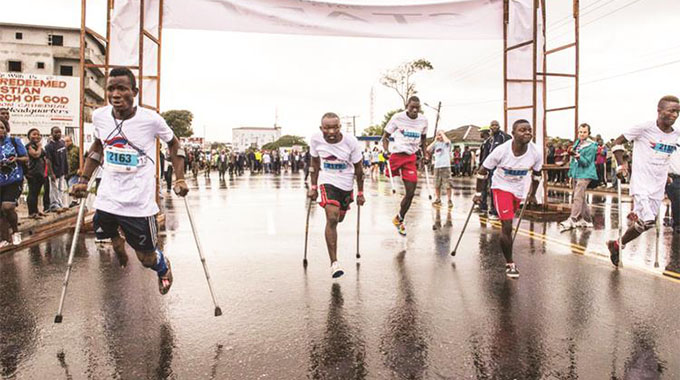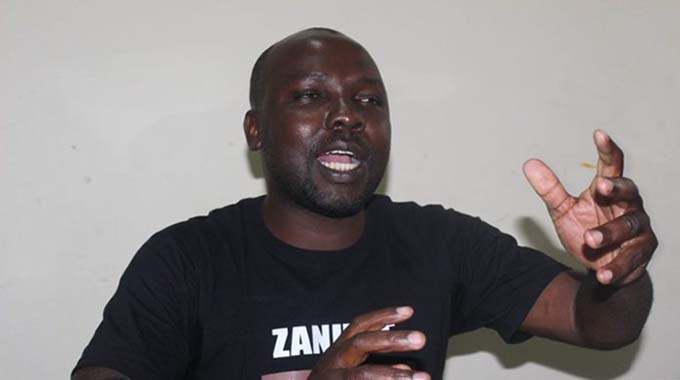Domestication of Disability Convention long overdue

Lovemore Rambiyawo Correspondent
People with disabilities, arguably the most marginalised group in Zimbabwe, continue to bemoan the lack of domestication of a seminally important international disability treaty signed by Government on September 23, 2013 that would have a lasting impact on disability inclusion for the estimated 2,4 million persons with disabilities (PWDs) in the country, if domesticated.
With the domestication of the United Nations Convention on the Rights of Persons with Disabilities (CRPD), disability exclusion would be consigned to the dustbin of history, and a new wave of disability inclusion and peaceful co-existence will be ushered in.
This will result in a progressive and inclusive society underpinned by adherence to the principles of human security, good governance, rule of law and human rights, disability inclusion and empowerment, and social, economic, and political development, would become the order of the day.
Domestication of the CRPD can be considered as the panacea to disability social exclusion: it gives vent to the implementation of the CRPD, which is the bedrock of disability rights internationally, a benchmark document and a roadmap to disability inclusion; and the first legally binding human rights instrument to comprehensively address the civil, cultural, political, social and economic rights of PWDs.
In addition to ensuring equalisation of opportunities for PWDs, it provides momentum for the removal of the multifaceted barriers that compound disability social exclusion in society.
Lack of disability-sensitive legislation combines with attitudinal barriers (society’s negative attitudes against disability), and environmental barriers (inaccessible buildings and environments for PWDs) to make life a nightmare for PWDs.
It is no wonder that PWDs have been referred to in certain circles as “The Forgotten Tribe” in Zimbabwe.
With the CRPD, together with other international human rights and development instruments, a comprehensive international framework is established to guide national policymaking and legislation, including international cooperation, for building an inclusive society, and fostering disability-inclusive development.
At the international level, the CRPD promotes and supports disability-inclusive policies and practices.
At the national level, it requires harmonisation of national legislation, policies and programmes in line with the international norms and standards that it sets.
It is this harmonisation of national legislation, policies and programmes with the CRPD, or rather, lack of this harmonisation, that continues to perpetuate the social exclusion of PWDs in all spheres of social, economic, political, and cultural life in Zimbabwe.
One cannot fully understand the impact of domestication of the convention without understanding how radically the UNCRPD differs in defining disability from earlier medical model of disability, which located disability squarely in the individual.
In contradistinction to the outdated medical model of disability, the CRPD defines disability as an evolving concept and that disability results from the interaction between persons with impairments and attitudinal and environmental barriers that hinder their full and effective participation in society on an equal basis with others.
Disability is, thus, socially created and demands a social and political response. Domesticating the convention would, therefore, ensure a wholesome and holistic implementation of disability issues across the entire human rights spectrum.
The CRPD recognises that disability problems are multiple, interconnected and intractable, and, despite various international instruments and undertakings, persons with disabilities continue to face barriers in their participation as equal members of society and violations of their human rights in all parts of the world.
These instruments include the Universal Declaration of Human Rights, the International Covenants on Human Rights, the International Covenant on Economic, Social and Cultural Rights, the International Covenant on Civil and Political Rights, the International Convention on the Elimination of All Forms of Racial Discrimination, the Convention on the Elimination of All Forms of Discrimination against Women and the Convention against Torture and Other Cruel, Inhuman or Degrading Treatment or Punishment.
The other instruments are the Convention on the Rights of the Child, the International Convention on the Protection of the Rights of all Migrant Workers and Members of their Families, the principles and policy guidelines contained in the World Programme of Action Concerning Disabled Persons and in the Standard Rules on the Equalisation of Opportunities for Persons with Disabilities.
This clearly highlights the fact that PWDs and society have to go several gears up in implementing the CRPD in order to attain the same results than for other vulnerable groups.
Changing society’s bad practices, behaviour and negative attitudes against PWDs is no mean fit and requires concerted awareness raising and detailed implementation as outlined in the convention.
Dispelling myths and misconceptions, stigma and discrimination, stereotypes and caricatures, prejudices and bad practices requires skilful use of social media, which is a mega trend transforming our lives in every direction and has unbridled potential for social inclusion.
In addition to a disability-specific approach in which PWDs receive vital services across the entire social, economic, political and cultural spectrum as a population in need, domestication requires that disability mainstreaming, which is recognised in the CRPD as an integral part of sustainable development strategies, is implemented fully and effectively so that programmes, policies, plans, activities and strategies become inclusive of disability.
Given the complexity of disability mainstreaming and the limited resources of most Disabled Persons Organisations (DPOs), it is particularly important during the early stages of the process to identify the most strategic Government agencies with which to link.
It is necessary to link with oversight agencies and planning/policymaking bodies because of the roles that they play in planning, policymaking, resource allocation and coordination.
Line agencies or sectorial ministries that have a bearing on disability should also be linked with, including developing rapport with the Government’s national statistical agency because CSOs need all the help they can get in collecting, analysing and distributing the sex-disaggregated and disability-aggregated data.
This data is required to make a case for disability responsive planning and to turn plans into effective programmes; select the best sub-national agencies to pilot or model disability mainstreaming strategies at provincial, state and local levels; and link with educational institutions to access support and resources for the development and provision of disability training materials and disability-based research.
In order for disability mainstreaming to be successful, it is necessary for both DPOs and civil society (religious sector, academic sector, cause-oriented advocacy groups, and the media) to come up with practical plans and strategies of mainstreaming disability at general, international, regional, national, organisational and individual level and follow up on implementation of these plans.
Mainstreaming enables people with disabilities to contribute to the economy by availing them with educational opportunities and employment.
According to a World Bank study in 2000, the annual loss in global GNP due to the large number of unemployed people with disabilities was estimated to be between US$1,37 billion and US$1,95 billion.
There is need, however, for stakeholder capacity to be built on disability mainstreaming and to ensure practical coordination of disability mainstreaming so that there is clarity and cohesion on what mainstreaming entails and to ensure that stakeholders do not have divergent and often conflicting ideologies, views, approaches, agendas and strategies on the subject.
When that happens, different stakeholders might quarrel over strategy and stand in each other’s path.
The formulation of a disability mainstreaming policy is another way of ensuring that various stakeholders are united on a uniform strategy.
Domestication of the UNCRPD is the only way to ensure that the roadmap to disability inclusion is realised.
It facilitates more concrete actions and measures to further remove barriers, create accessible and enabling environments and conditions and to secure equal opportunities for participation by all PWDs.
Domestication ensures that the CRPD becomes a living document that can promote, protect and fulfil the rights of PWDs across the entire social, economic, political and cultural spectrum and ensure full and effective participation of people with disabilities in all spheres of life.
Lovemore Rambiyawo is physically-impaired, and is Acting Executive Director of the National Association of Societies for the Care of the Handicapped (NASCOH), an umbrella body for 70 disability organisations in Zimbabwe. He can be reached at: [email protected]







Comments